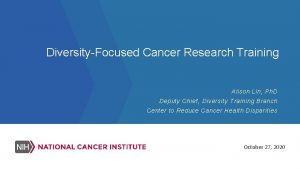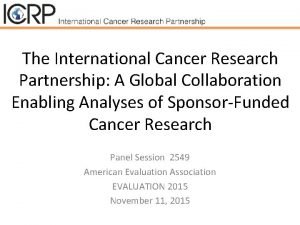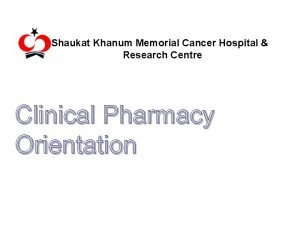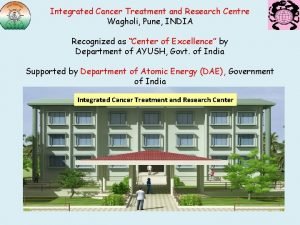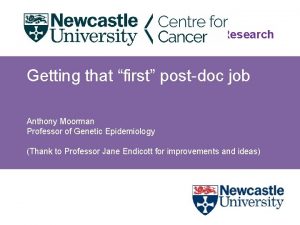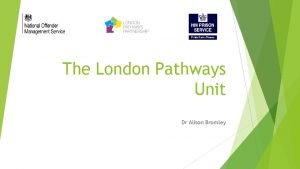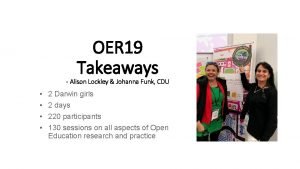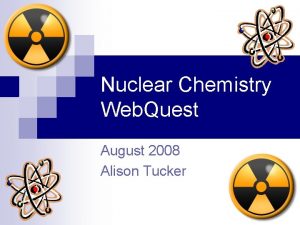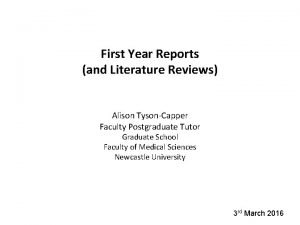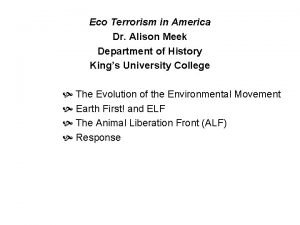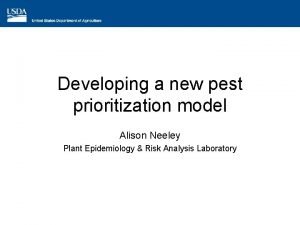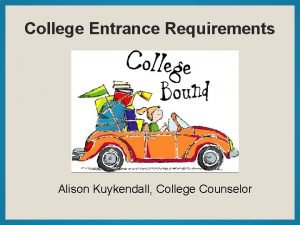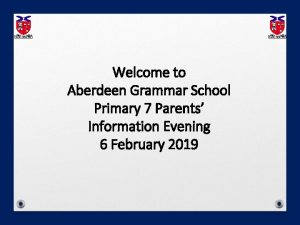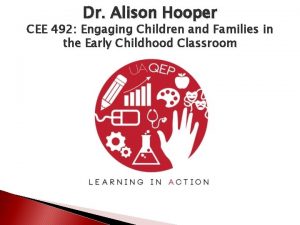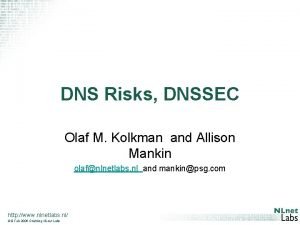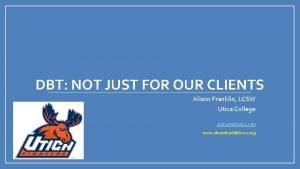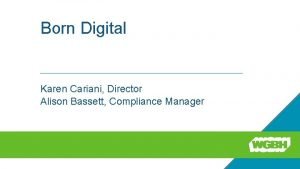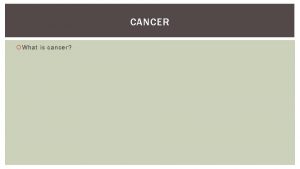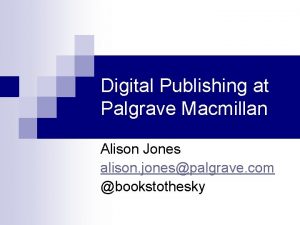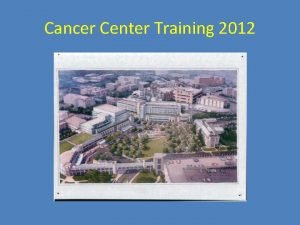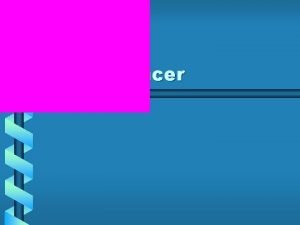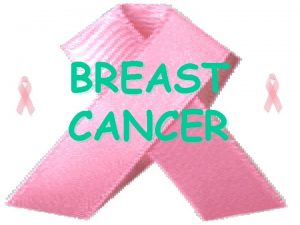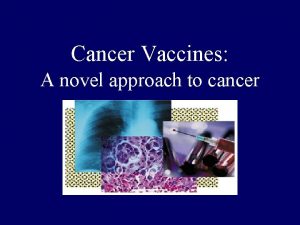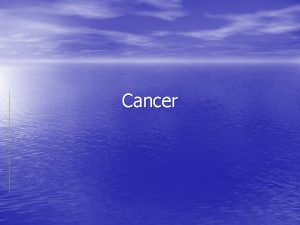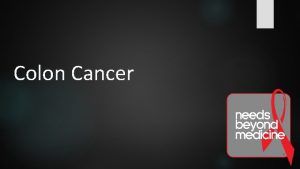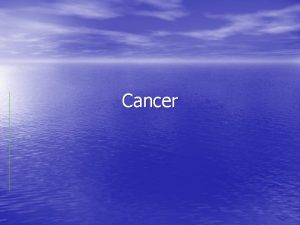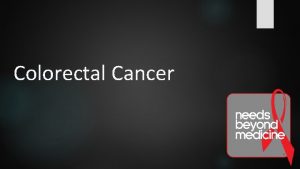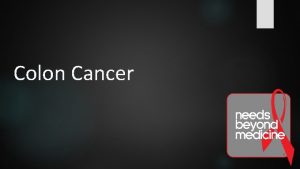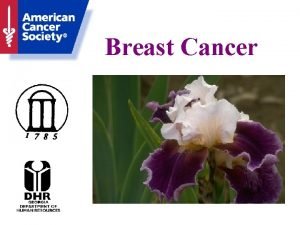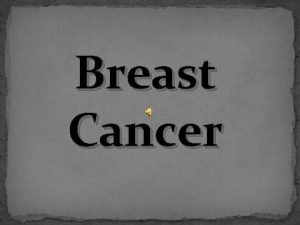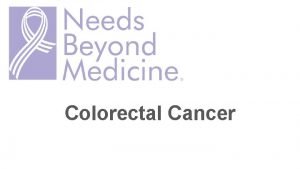DiversityFocused Cancer Research Training Alison Lin Ph D
































- Slides: 32

Diversity-Focused Cancer Research Training Alison Lin, Ph. D Deputy Chief, Diversity Training Branch Center to Reduce Cancer Health Disparities October 27, 2020

NCI Center to Reduce Cancer Health Disparities (CRCHD) Diversity Training Partnerships • Partnerships to Advance Cancer Health Equity (PACHE) Cancer Health Disparities Research • Basic research • Translational research Networks • • Geographic Management of Cancer Health Disparities Program (GMa. P) National Outreach Network (NON) 2

NCI Diversity-Focused Training Programs Extramural: Continuing Umbrella of Research Experiences (CURE) • • • Support research experiences of underrepresented students and scientists Promote professional and career development Help the trainees achieve research independence Intramural: Intramural Continuing Umbrella of Research Experiences (i. CURE) 3

More Than a Pipeline: CURE and i. CURE Provide an Ecosystem of Support GMa. P: In-Region Connections Professional Development Workshop Mock Review Mentored Research Experience Technical Assistance Workshop Virtual Platforms Navigation of Trainees 4

Extramural: Continuing Umbrella of Research Experiences (CURE) Emphasize scientific areas of greatest need Expand extend the period of training Increase the size of the talent pool Focused on enhancing diversity: Trainees must be US citizen, non-citizen nationals or permanent resident Race/Ethnicity Disability Disadvantaged Background 5

CURE Trainees (2001 -2018, n = 4, 753) are Diverse Career Levels Demographics 1% 2% 3%0% 4% 2% 3% 4% 6% 12% 17% 11% 2% 35% 42% 1% American Indian or Alaska Native Asian Black or African American Disability Hispanic or Latino Native Hawaiian or Pacific Islander Unknown White Low SES 29% 24% Middle School High School Undergraduate Graduate Post-Bac/Post-Masters Postdoc Investigators 6

CURE Funding Mechanisms F 31 Diversity Supplements R 25 YES K 01, K 08, K 22 R R 2 0 1 1 Individual Awards Institutional Awards Individual Awards Re-entry Supplements 7

Diversity and Re-entry Supplements Diversity Supplements Re-entry Supplements 8

Supplements within the CURE: Diversity and Re-Entry • Provide additional funding to currently active NIH grants (parent grants) to support research experiences of trainees • Parent grant must have at least two years of active status at the time of supplement application • Application receipt: Oct 1 – Dec 1 and Feb 1 – Mar 30 • A bridge for candidates to progress to the next academic/career level • Diversity Supplements: http: //www. cancer. gov/aboutnci/organization/crchd/diversity-training/cure/DSGuidelines • Re-entry Supplements: http: //www. cancer. gov/aboutnci/organization/crchd/diversity-training/cure/Re. Entry. Guidelines 9

Diversity Supplements: Special Eligibility Criteria for Graduate Students and Postdoctoral Fellows § No concurrent PHS support for graduate student or postdoctoral fellow candidate at the time of application: Ø Cannot be supported by parent grant Ø If coming off of institutional training grant, need letter from institution § AFTER application submission: Ø Can be supported by the parent grant at the recipient’s own risk, pending funding decision of supplement application 10

What Do We Look for in a Supplement Application? Candidate • • Mentoring and Career Development Plan Motivation • Scientific proficiency Accomplishments and mentoring expertise Career goals of mentor(s) Eligibility statement • Defined role(s) and commitment of mentor(s) • Training of career skills • Clear benchmarks • Candidate-specific plans Research Plan • Relevancy to Parent Grant project • Scientific impact on Parent Grant project • Research design and feasibility • Alignment with candidate’s career goals 11

Suggested Timeline for Preparing a Supplement Application 5 Months Prior • • 3 Months Prior Identify mentor/candidate Match interests Plan application Contact NCI Program Director • • • 1 Month Prior Write application Ask people to review Revise and revise Assemble application components Finalize Submission Deadline • • • Start submission process Remember institution deadlines Leave room for submission logistics issues 12

Ruth L. Kirschstein NRSA Individual Predoctoral Fellowship to Promote Diversity in Health. Related Research (F 31) F 31 13

F 31 Diversity Predoctoral Fellowship (PA-20 -251) § Objective: To increase biomedical workforce diversity by supporting mentored research training leading to a Ph. D or combined dual doctoral degrees. § Benefits Ø Individualized, mentored research training. Ø Experience conducting impactful research as well as presenting and publishing research findings as a first author. Ø Development of a stronger grants skillset which improves competitiveness for NIH funding. Ø Student is the PI of the F 31. § Application receipt: Dec. 8, April 8, and August 8 § Support is provided for up to 5 (Ph. D. ) or 6 years (combined degrees, ex. MD/Ph. D) 14

5 Important Elements of an F 31 Diversity Application 1. Fellowship Applicant 2. Sponsors, Collaborators, and Consultants 3. Research Training Plan 4. Training Potential 5. Institutional Environment & Commitment to Training • Strong academic record • • • Some research experience • Specific Aims clearly described Highlight skills for Independent Career • • Overall scientific impact Explain selection of academic institution • Describe activities that support future career as an independent researcher • Discuss how features of scientific environment will enhance success • • Excellent letters of recommendation Eligibility letter • • Sponsor is active, funded investigator in area of proposed research Must devote time and commitment to trainees’ success Should have a history of mentoring success • Objective, Approach, Innovation, Significance 15

Suggested Timeline for Preparing an F 31 Diversity Application 8 -6 Months Prior 4 -3 Months Prior • Notify NCI PD of intent to apply • Become familiar with the Program Announcement & Instruction requirements • Begin 1 st draft of application working with Sponsor 1 Month Prior • Ask grant writing experts to review 2 nd draft of application • Focus on required sections of the F 31 application • Update NCI PD of progress • Review, Edit, Revise!! Submission Deadline • Final draft of application • Refer to PA and Instructions for submission guidance • Utilize Institutional resources in submission process 16

Career Development K Awards to Promote Diversity K 01, K 08, K 22* *Investigators in tenure-track faculty positions are not eligible 17

NCI Career Development Awards (K Awards) § Objectives: Ø Provide protected time and salary support for 3 -5 years of intensive training and research Ø Promote career development activities to enhance candidate’s research capabilities Ø Expectation is that awardees will be prepared to lead independent research programs and become competitive for NIH research project grants § Requirements: Ø An academically strong candidate with prior research experience and publications Ø A well-defined research project with scientific impact and structured training activities Ø Experienced, committed, & funded mentor/mentoring team (advisory committee for K 22) Ø Institutional commitment to candidate’s career development and 75% protected time 18

NCI K Awards Supported by CRCHD Upcoming Application Due dates: October 12, February 12 K Award Mentored or Non. Mentored K 01 Mentored K 22 K 08 Non-Mentored Research Focus Salary up to All Cancer-Related Research $100 k Clinical, Translational & Patient-Oriented Research $189 k Max R&D Duration Support $30 k 3 -5 years $50 k 3 -5 years 19

FOAs: Clinical Trial Allowed vs No Independent Clinical Trials § FOAs Ø NCI Mentored Research Scientist Development Award to Promote Diversity (K 01) PAR-18 -364: https: //grants. nih. gov/grants/guide/pa-files/PAR-18 -364. html PAR-18 -365: https: //grants. nih. gov/grants/guide/pa-files/PAR-18 -365. html Ø NCI Mentored Clinical Scientist Research Career Development Award to Promote Diversity (K 08) PAR-18 -336: https: //grants. nih. gov/grants/guide/pa-files/PAR-18 -336. html PAR-18 -337: https: //grants. nih. gov/grants/guide/pa-files/PAR-18 -337. html Ø NCI Transition Career Development Award to Promote Diversity (K 22) PAR-18 -366: https: //grants. nih. gov/grants/guide/pa-files/PAR-18 -366. html PAR-18 -367: https: //grants. nih. gov/grants/guide/pa-files/PAR-18 -367. html 20

Eligibility Criteria: NCI Diversity K 01 and K 08 § Research, clinical or health-professional doctoral degree or equivalent § Clinical doctorate or Ph. D in clinical disciplines (K 08) § Full-time appointment at an academic institution at the time of the award § ≤ 5 years of total postdoctoral training at the time of application § The K 08 award may be used by candidates with different levels of prior research training and at different stages in their mentored career development § No individual NIH K awards or other pending PHS K applications or peer -reviewed research grants. Former PIs of R 03, R 21, R 36 or SBIR remain eligible 21

Eligibility Criteria: NCI Diversity K 22 § Clinical, research doctorate or combined degree § Affiliation with a domestic extramural or Federal institution at the time of submission or resubmission § ≤ 8 years of mentored, non-independent postgraduate training after terminal degree/clinical residency at time of application § No tenure-track faculty position or accepted offer § Applicants are expected to submit an R 01 application by the end of year 2 of the award § No individual NIH K awards or other pending PHS K applications or peer-reviewed research grants (except R 03, R 21) 22

What Do We Look for in a Career Development Application? Candidate Career Development and Mentoring Plan Research Plan • Excellent training & • Structured career • Good training vehicle to research development plan establish applicant’s experience niche • Matched expertise & • Highly productive strong mentoring track • Sound approach (peer-reviewed record of mentor(s) (appropriate research publication record) • Strong reference design and feasible) • Clear career goals • Eligibility letters • Strong environment & institutional support • Well written with good alignment with applicant’s career goals 23

Suggested Timeline for Preparing a K-Award Application 6 -9 Months Prior • • • Perform self and skills assessment Identify gap areas Identify mentors, collaborators Plan application Contact NCI Program Director 3 -6 Months Prior • • • 1 Month Prior Write application Ask people to review Revise and revise Assemble application components Finalize Submission Deadline • • • Start submission process Remember institution deadlines Leave room for submission logistics issues 24

R 25 Youth Enjoy Science Research Education Grant R 25 YES 25

R 25 Youth Enjoy Science Research Education Program Purpose: YES promotes effective early intervention strategies to engage underrepresented middle school, high school and undergraduate students in cancer research Reissue of FOA PAR-17 -059: anticipated late 2020 R 25 YES Requires Three Activities Research Experience § § Individual, mentored research experience for high school students and more senior Strong mentoring support Curriculum / Methods § § Education tools for students Teacher/faculty participants develop activities to bring back to classroom Outreach § Engage middle school students in cancer research activities § Support career and professional development of students § Meaningfully engage families, teachers and communities in support of students § Dissemination of program information § Education and dissemination of cancerrelated information to family and community 26

Tips for Grant Applications: § Find NIH grants and funding information: https: //grants. nih. gov/grants/oer. htm § Visit NIH extramural diversity website: https: //extramural-diversity. nih. gov § Learn about peer review at NIH Center of Scientific Review: https: //public. csr. nih. gov/Applicant. Resources/Pages/default. aspx 27

Intramural Continuing Umbrella of Research Experiences (i. CURE) Program i. CURE 28

i. CURE Enhances Diversity in NCI Intramural Research Program • i. CURE is new – launched in December 2017 • Mentored research experiences on NCI campuses in Bethesda, Shady Grove (Rockville) and Frederick, Maryland • Supports postbacs (including Post Master’s), graduate students and postdocs • Centralized review and program-facilitated matches for scholars to PIs in NCI Intramural Research Program • No limitation on research areas within NCI Post-baccalaureate (Incl. Post-master’s) One-year research experience awards Graduate Students Two-year research experience awards Postdoctoral Fellows Three-year research experience awards 29

Apply to i. CURE, Connect to i. CURE Applications accepted now: October 15 – December 20, 2020 https: //www. cancer. gov/aboutnci/organization/crchd/diversity-training/icure i. CURE Program Team Email: i. CURE@nih. gov @NCICRCHD @NCIResearch. Ctr @NCIEpi. Training 30

Questions? Contact Alison Lin, Ph. D linaj@mail. nih. gov @NCICRCHD https: //www. cancer. gov/about-nci/organization/crchd 31

www. cancer. gov/espanol
 Alison lin nci
Alison lin nci International cancer research partnership
International cancer research partnership Shaukat khanum pharmacy
Shaukat khanum pharmacy Wagholi cancer research center
Wagholi cancer research center Northern institute for cancer research
Northern institute for cancer research Cay ryan murray wikipedia
Cay ryan murray wikipedia Alison voice leeds
Alison voice leeds Alison bromley
Alison bromley Alison is jogging on a circular track
Alison is jogging on a circular track Real life superheroes book by alison
Real life superheroes book by alison Alison crane
Alison crane Dr alison giles
Dr alison giles Alison lockley
Alison lockley Dr alison tucker
Dr alison tucker Alison bourke
Alison bourke Alison tyson xxx
Alison tyson xxx Alison meek
Alison meek Pest control alison
Pest control alison Alison kuykendall
Alison kuykendall Dr alison landrey
Dr alison landrey Nina champaneri
Nina champaneri Alison ernst
Alison ernst Alison kirkwood
Alison kirkwood Aberdeen grammar school uniform
Aberdeen grammar school uniform Nessie by j k annand
Nessie by j k annand Alison fraser
Alison fraser Alison woodcock
Alison woodcock Alison armstrong quotes
Alison armstrong quotes Alison hooper
Alison hooper Alison molaf
Alison molaf Alison franklin lcsw
Alison franklin lcsw Alison bassett
Alison bassett Alison pemberton
Alison pemberton
